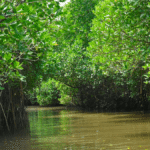Where is Baku Located?
Baku is the capital city of Azerbaijan, located on the Caspian Sea coast. It serves as the largest city and the economic, cultural, and political hub of Azerbaijan. Situated in the southeastern part of the country, Baku lies at a unique crossroads where Europe meets Asia. The city has a rich history, blending modern infrastructure with ancient traditions, making it an important center for both the region and the world.
Geographical Significance of Baku
Baku’s location is of great strategic importance. The city is located on the Absheron Peninsula, extending into the Caspian Sea. Due to its proximity to major oil and gas reserves in the Caspian Basin, Baku has long been known for its oil wealth, dating back to the early 20th century. The city’s position makes it an essential port for trade, particularly with neighboring countries such as Russia, Iran, and Turkey. Its coastal location also makes it an attractive destination for tourism, offering a unique combination of beach resorts and historical landmarks.
Baku’s Role in International Trade and Politics
Baku has emerged as a key player in international trade due to its rich natural resources, including oil, natural gas, and minerals. The city is a major energy hub, facilitating the transport of resources to other regions through pipelines and oil tankers. In recent years, Baku has strengthened its global presence by hosting international events such as the Formula 1 Grand Prix and the European Games. This global recognition has cemented Baku’s role as a political and economic powerhouse in the region.

Why This News is Important
A Gateway to Energy and Trade
Baku’s geographical location makes it a vital hub for energy production and export. The city’s significance in the energy sector has attracted global attention, particularly with the construction of the Baku-Tbilisi-Ceyhan (BTC) pipeline, which connects the Caspian Sea with international markets. The ability to export oil and gas efficiently has boosted Azerbaijan’s economy and positioned Baku as a key player in global energy markets.
Cultural and Historical Importance
The city’s unique mix of modern architecture and ancient landmarks showcases its rich cultural heritage. Baku’s Old City, a UNESCO World Heritage site, contains architectural wonders from the 12th century, while the Flame Towers represent the city’s rapid modernization. This blend of history and modernity makes Baku an important cultural center in Central Asia, attracting tourists, scholars, and diplomats alike.
Strategic Political Location
Baku’s position at the crossroads of Europe and Asia also has significant political implications. Azerbaijan’s foreign policy and its relations with countries like Russia, Turkey, and Iran often involve strategic discussions related to energy, security, and trade. Understanding Baku’s importance helps contextualize regional geopolitics and its influence on global affairs.
Historical Context
Baku’s history dates back over a thousand years, and its significance has evolved considerably over time. Initially, it was a small settlement and a prominent stop on the Silk Road. However, with the discovery of oil in the late 19th century, Baku transformed into a global oil hub. The city’s oil industry attracted foreign investment, and by the early 20th century, Baku was producing significant amounts of crude oil, leading to its rapid urbanization.
During the Soviet era, Baku continued to be an essential industrial center, contributing greatly to the USSR’s energy production. After Azerbaijan gained independence in 1991, Baku capitalized on its natural resources to establish itself as a thriving economic city in the newly formed Republic of Azerbaijan. Since then, the city has hosted many global events, including the Eurovision Song Contest in 2012, which showcased its modern, cosmopolitan image.
Key Takeaways from “Where is Baku Located?”
| Serial No. | Key Takeaway |
|---|---|
| 1 | Baku is the capital city of Azerbaijan, located on the Caspian Sea coast. |
| 2 | It is a major energy hub due to its oil and gas resources. |
| 3 | Baku’s strategic location on the Absheron Peninsula makes it an important port for trade. |
| 4 | The city blends modern infrastructure with historical landmarks, including the UNESCO World Heritage-listed Old City. |
| 5 | Baku plays a key role in regional geopolitics, particularly in energy politics, with significant relations with Russia, Iran, and Turkey. |
Important FAQs for Students from this News
What is Baku known for?
Baku is known for being the capital city of Azerbaijan, its rich oil reserves, historical landmarks like the Old City (a UNESCO World Heritage site), and its modern infrastructure. The city also plays a significant role in regional geopolitics and global energy markets.
Where is Baku located geographically?
Baku is located on the Caspian Sea coast, on the Absheron Peninsula in southeastern Azerbaijan. It is a key geographical point where Europe meets Asia.
Why is Baku a significant city in the energy sector?
Baku has historically been an important oil-producing city, especially during the late 19th and early 20th centuries. Today, it continues to be a key energy hub, with oil and gas resources playing a major role in the region’s economy.
What are some important landmarks in Baku?
Baku is home to numerous landmarks, including the UNESCO World Heritage-listed Old City, the Flame Towers, and the modern Heydar Aliyev Center designed by Zaha Hadid. These landmarks represent a blend of ancient and contemporary architecture.
How does Baku’s location impact its geopolitical importance?
Baku’s strategic location at the crossroads of Europe and Asia allows it to play a key role in regional trade, energy supply, and political alliances with countries like Russia, Iran, and Turkey.
Some Important Current Affairs Links

















